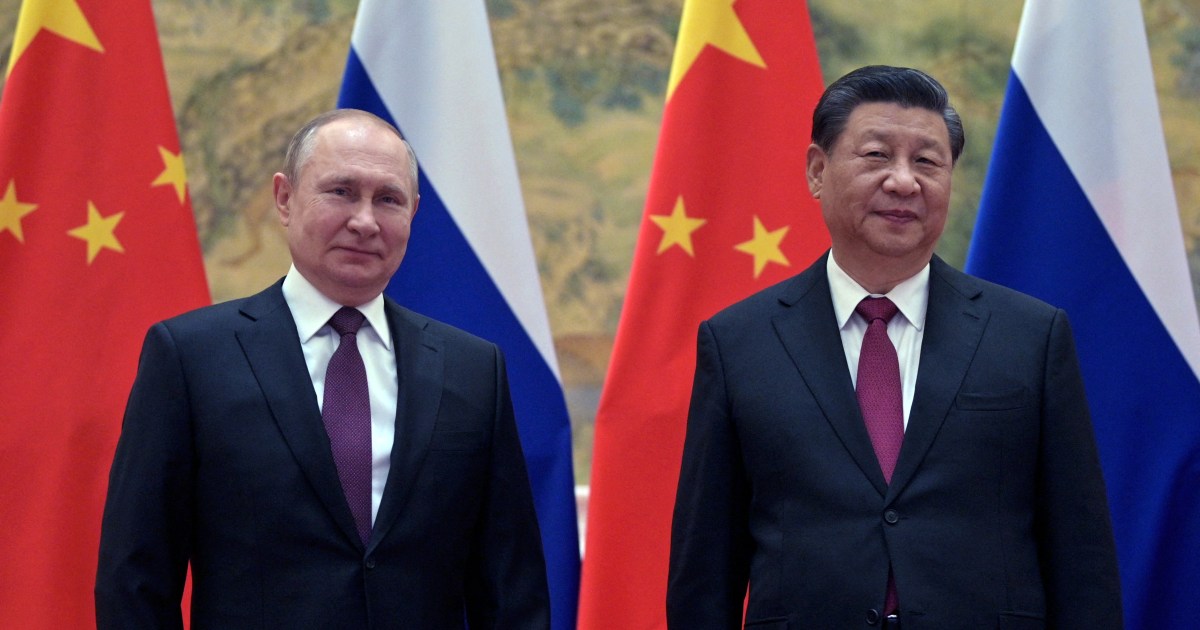Moscow -
A clear Russian-Chinese rapprochement against the background of the worsening crisis between Moscow and the West was reinforced by Russian President Vladimir Putin's visit to Beijing and his talks on Friday with his Chinese counterpart Xi Jinping, according to the two leaders' statements and the statement issued by the results of their talks.
It is worth noting that face-to-face meetings with world leaders are an unusual form for the Russian president, who usually holds talks with them, whether by video or telephone.
For the Chinese president, his Russian counterpart is the first world leader he has met face to face since the start of the coronavirus pandemic since January 2020.
Ross observers believe that the "exceptionalism" of the meeting between Xi and Putin is in itself a response from Moscow and Beijing to the "unfriendly" policy of the West, and will have effects on world politics.
boycott challenge
Putin - who arrived in Beijing to attend the opening ceremony of the Winter Olympics (which the West is boycotting) - held talks with his Chinese counterpart, which ended with the signing of a joint statement, which was remarkable, referring to the entry of international relations into a new era, and the inauguration of a deep strategic partnership between the two countries.
Putin's visit to China began with the signing of wide-ranging agreements on additional supplies of Russian natural gas to China. Moreover, another 10 billion cubic meters of blue fuel will be transported along the Far East Road to China, from a field subject to US sanctions.
Russian experts express their conviction that the Chinese market is not only capable of replacing the European market for Russia, but will also free Moscow's hand.
The volume of gas consumption in China is currently 360 billion cubic meters annually, but this number is increasing at an annual rate ranging between 10% and 14%, which means that within 5 to 7 years, the volume of Chinese consumption will double.
With the extension of the Soyuz-Vostok gas pipeline through Mongolia, the volume of Russian gas supplies to China will be equal to the volume of Russian gas supplies to Europe and Turkey.
geopolitical changes
Economic researcher Alexander Dodchak says that this agreement between Beijing and Moscow brings for Russia not only economic changes, but also geopolitical changes, as Europe will have to compete seriously with China for Russian gas in the future, and the market size will grow faster because China announced Plan to be carbon neutral by 2060.
Dodchak continues in an interview with Al Jazeera Net that coal makes up 60% of energy consumption in China, and from here it will be completely converted to other sources, and of course it will be natural gas, nuclear energy and others;
One of the main areas of Russian-Chinese cooperation.
The Russian-Chinese summit comes against the backdrop of deteriorating relations between Moscow and Beijing with the West.
Which, according to Russian experts, will give the Russian and Chinese presidents an additional incentive to enhance cooperation between them, although Russia supports the Chinese position on the Taiwan file, and supports the "one China" principle, while Beijing does not recognize Russia's annexation of the Ukrainian Crimea.
Both China and Russia resent the policies of the West towards them, and want to participate in the planning of world politics on an equal footing with the Western countries.
delimitation of interests
International affairs analyst Denis Korkodinov believes - in an interview with Al Jazeera Net - that the greater rapprochement between China and Russia was facilitated by the demarcation of the borders of interests between the West, China and Russia.
In addition to economic cooperation, Beijing and Moscow share common interests and values. China supports Russia's political line towards Ukraine and the North Atlantic Treaty Organization (NATO).
In addition, both China and Russia resent Western policies towards them, and want to participate in planning world politics on an equal footing with Western countries.
In this sense, China has found Russia a military and political partner.
The Russian expert Korkodinov cautions that it was not in vain in this context that the Russian-Chinese joint statement focused on strengthening cooperation and coordination in international organizations, especially in the United Nations, which, although it has always been a tradition for Moscow and China, has recently intensified even more.
Russians and Chinese alike object to a "unipolar world" and to traditional international multilateral institutions as the foundation of the international system.
Russia and the West
The Russian expert also considers that the alliance of Russia and China strengthens their position in negotiations with the West on problematic issues.
He adds that he has repeatedly offered Moscow in the past to go hand in hand with the West against China, in exchange for promises and concessions that quickly faded.
Korkodinov continues that it has become clear that Russia no longer believes in these Western promises, and has begun to prefer the real alliance with China over the illusory position it promised in the Western system.
He concludes that China falls under Russia's "umbrella" in the field of military cooperation.
At the same time, the Chinese armed forces are growing and technologically developing tremendously, which has become a threat to the United States and those operating in space.

